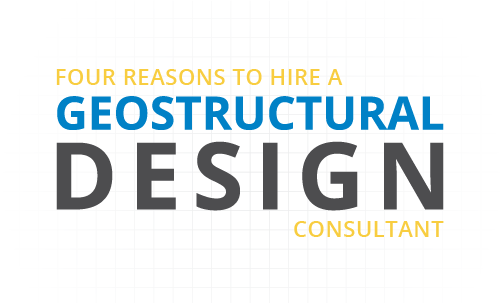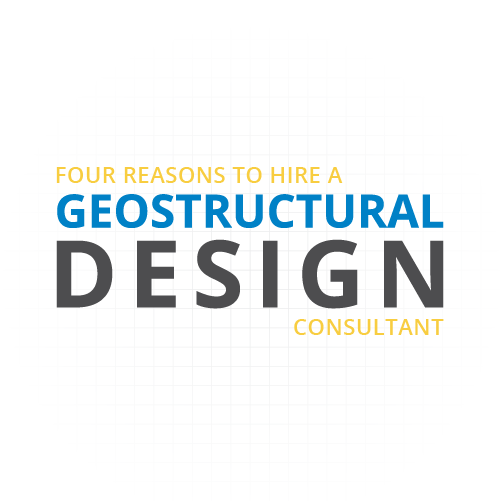
|
Geostructural design arises out of strange necessity. In a scenario with limitless open space and fantastic consistent soils, it becomes unnecessary. However, in a realistic world with complex sites and decreasing open space, innovative solutions are the order of the day. As this paradigm developed over time, design and installation of these systems became the realm of specialty contractors with specialized installation techniques. However, due to the unique aspects of geostructural design and the risks that come with it, there are several key reasons it makes sense to |
1. THE RIGHT SOLUTION FOR THE PROJECT
The geostructural market has grown rapidly with the advancement of technologies and the decline
of the availability of open sites with good soil conditions. With such rapid growth has come an increase in the number of specialty firms or firms adding specialty services to their existing
portfolio. This market fact results in the incentivization of “best value” bidding by an increasing number of specialty providers.
Commercially, this would seem to benefit the project owner. However, factors at play specific to geostructural projects set them apart from specialty contractor methods. Specialty contractors may favor a specific technique or solution that best fits their financial needs versus what’s best for the client. A geostructural design consultant is a neutral party and may consider multiple techniques, independent of cost, to provide the best results for a client.
2. NO CODE, NO CLARITY
In non-specialty construction (for ex. windows and doors), the variances in pricing between competing contractors is real, but those differences are generally small and definable. Geostructural pricing can be highly variable. This often comes down to the techniques and capacity of the various contractors, the current backlog and a wide array of bidding factors familiar to any contractor.
These significant price differences can also be driven by factors generally not encountered in other contracting. The codes, design procedures and best practices for many types of geostructural design are much less established and rigid than other types of design and construction. The lack of building codes for these geostructural systems often results in innovation. Still, it can also result in broad scope and price differences, which may include design assumptions and risk tolerances specific to the specialty contractor.
3. COST + RISK REDUCTION FOR ALL PARTIES
With any engineered and constructed solution, it is in the best interest of all parties to provide a solution driven by performance and value. However, sometimes specialty contracting scopes vary purely based on the shortage of design guidance relative to other types of construction. In some cases, this results in differences in pricing purely based on the calculated performance risk the contractor is willing to take concerning geotechnical parameters. If the project performs well, all parties are happy. If a performance issue occurs, the project owner can be left to carry risk which
was never communicated to them. For these reasons, hiring a geostructural designer will benefit
the client.
4. A BALANCED APPROACH
Our experience suggests that a project approach to balance risk, expectations and clarity is to engage an experienced geostructural designer to produce a design. The designer should be well-versed in designing and constructing such systems. However, the designer should engage with specialty contractors during the bidding phase to allow room for the suggestion and vetting of creative solutions and help communicate the costs, benefits and risks to the owner.
By balancing the interests of engineering performance, client expectations and contractor creativity, the geostructural design consultant can:
- Independently represent the owner
- Act as a baseline for competitive bidding
- Be a conduit for creative collaboration between the project team and potential specialty contractors
- Balance the expectations and interests of all parties
This is the third and final post in our first series about geostructural design.
Keep reading for more information.
Series 1 – Geostructural Design:
Part 1: What Is Geostructural Design and Engineering?
Part 2: Unique Aspects of Geostructural Design
Series 2 – Contractor Delegated Design:
Part 1: What Is Contractor Delegated Design?
Part 2: Delegated Design Benefits, Risks and Pitfalls
Part 3: Bridging the Gap for Delegated Design
Series 3 – Earth Retaining Systems:
Part 1: Earth Retaining Structures: Who Designs Them… and How Do They Work?
Parts 2 + 3: Coming Soon
About the experts
Karl Higgins, PE, D.GE, earned a bachelor’s and master’s in engineering with a focus on geotechnical engineering.
Doug Chappell, PE, has a bachelor’s degree in mining engineering with experience in consulting and design-build specialty contracting.
Combined, they have more than 60 years of experience. Together, Doug and Karl lead the geostructural design practice at ECS.
Contact us to discuss your geostructural design needs.

